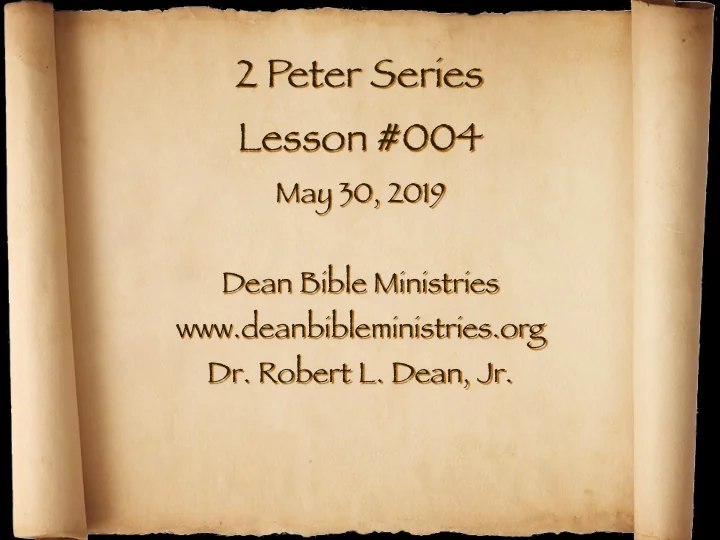

2 Peter Series Lesson #004 May 30, 2019 Dean Bible Ministries www.deanbibleministries.org Dr. Robert L. Dean, Jr.
A POSTLE OF J ESUS C HRIST 2 P ETER 1:1
2 Pet. 1:1, “Simon Peter, a bondservant and apostle of Jesus Christ, To those who have obtained like precious faith with us by the righteousness of our God and Savior Jesus Christ:”
2 Pet. 1:1, “Simon Peter, a bondservant and apostle of Jesus Christ, To those who have obtained like precious faith with us by the righteousness of our God and Savior Jesus Christ:” δοῦλος doulos 37 × in New Testament epistles masc sing nom (m) slave
2 Pet. 1:1, “Simon Peter, a bondservant and apostle of Jesus Christ,” aÓpo/stoloß ∆ Ihsouv δοῦλος doulos Cristouv 37 × in New apostolos Iesou Christou Testament “ apostolos” has no epistles article which emphasizes masc sing nom the quality of the noun (m) slave “commissioned to perform a task; sent on a mission, a military or political envoy, an ambassador”
Moses is called the servant ( abad ) of the Lord (Deut. 34:5; Josh. 1:1, 13; 8:31; 2 Chron. 1:3; 24:6 et al); “My servant Moses” (Num. 12:7–8); “My servant Caleb” (Num. 14:24); David (2 Sam. 3:18; 7:5, 8; 1 Kings 11:13; Psa. 18; 36; 89:3, 20; Jer. 33:21); “My servant Job” (Job 1:8; 2:3; 42:7–8); “My servant Eliakim, the son of Hilkiah” (Isa. 22:20); “Israel, My servant” (Isa. 41:8–9; Isa. 49:3); Nebuchadnezzar (Jer. 25:9; 27:6); “Well done, good and faithful servant” (Matt. 25:21)
Phil. 2:7, “but made Himself of no reputation, taking the form of a bondservant, and coming in the likeness of men. Phil. 2:8, “And being found in appearance as a man, He humbled Himself and became obedient to the point of death, even the death of the cross.”
Rom. 3:10, “As it is written: ‘There is none righteous, no, not one; Rom. 3:11, “ ‘There is none who understands; There is none who seeks after God.’ ” Rom. 3:23, “for all have sinned and fall short of the glory of God,”
Rom. 6:16, “Do you not know that to whom you present yourselves slaves to obey, you are that one’s slaves whom you obey, whether of sin leading to death, or of obedience leading to righteousness?”
Rom. 6:17, “But God be thanked that though you were slaves of sin, yet you obeyed from the heart that form of doctrine to which you were delivered.”
Rom. 6:18, “And having been set free from sin, you became slaves of righteousness. Rom. 6:19, “I speak in human terms because of the weakness of your flesh. For just as you presented your members as slaves of uncleanness, and of lawlessness leading to more lawlessness, so now present your members as slaves of righteousness for holiness.”
What the Bible Teaches About Apostleship
1. apostle [ aÓpo/stoloß apostolos ] Cl Grk : the commander of a military or naval operation or governor of a Greek colony. New Testament : A man in the New Testament officially commissioned by an authorizing agent and given the authority to perform a task.
2. The first use of the verb is in Mark 3:14; The first use of the noun is in Matt. 10:2; Luke 6:13.
Mark 3:14, “Then He appointed twelve [“and called them apostles” Cr Text but doubtful, not in Majority Text], that they might be with Him and that He might send them out to preach,” Matt. 10:2, “Now the names of the twelve apostles are these: first, Simon, who is called Peter, and Andrew his brother; James the son of Zebedee, and John his brother;” Luke 6:13, “And when it was day, He called His disciples to Himself; and from them He chose twelve whom He also named apostles:”
3. Jesus as the apostle of our Faith. Hebrews 3:1, “Therefore, holy brethren, partakers of the heavenly calling, consider the Apostle and High Priest of our confession, Christ Jesus,”
4. Uses in the New Testament: 79 uses of the noun; 66 in Acts & Epistles 130 uses of the verb; most are general
5. The key issue to determine in context is: Who is doing the sending? What is the mission? When does the sending occur (in the Gospels or in the Church Age)?
6. “Apostle” was a temporary spiritual gift. 1 Cor. 12:28, “And God has appointed these in the church: first apostles, second prophets, third teachers, after that miracles, then gifts of healings, helps, administrations, varieties of tongues. 1 Cor. 12:29, “Are all apostles? Are all prophets? Are all teachers? Are all workers of miracles?”
1 Cor. 13:8, “Love never fails. But whether there are prophecies, they will be done away; whether there are tongues, they will cease; whether there is knowledge, it will be done away. 1 Cor. 13:9, “For we know in part and we prophesy in part. 1 Cor. 13:10, “But when that which is perfect has come, then that which is in part will be done away.”
1 Cor. 13:11, “When I was a child, I spoke as a child, I understood as a child, I thought as a child; but when I became a man, I put away childish things. 1 Cor. 13:12, “For now [ arti ] we see in a mirror, dimly, but then face to face. Now [ arti ] I know in part, but then I shall know just as I also am known.”
1 Cor. 13:13, “And now [ nuni ] abide faith, hope, love, these three; but the greatest of these is love.”
Heb. 11:1, “Now faith is the substance of things hoped for, the evidence of things not seen.” Rom. 8:24, “For we were saved in this hope, but hope that is seen is not hope; for why does one still hope for what he sees? Rom. 8:25, “But if we hope for what we do not see, we eagerly wait for it with perseverance.”
Recommend
More recommend